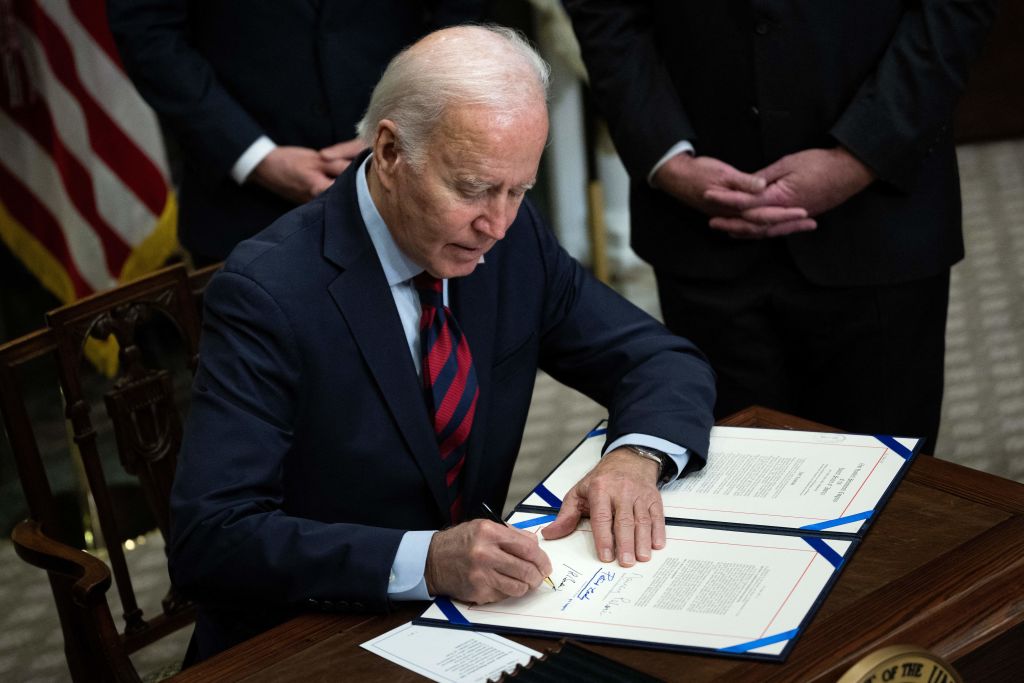The most pro-labor president in history?
Is Joe Biden the most pro-labor president in history or a ruthless union buster? Last September he declared his intention to be the former, but today brings news that makes him look a bit more like the latter.
This morning Biden signed a measure passed by the Senate Thursday that forces an end to the standoff between rail companies and workers that threatened a major freight rail strike. The legislation binds both sides into an agreement that four of the twelve unions involved had opposed because it lacked paid sick leave.
Biden sought to ease labor frustration at the measure at this morning’s signing that “we still have more work to do” and expressing his support for paid sick leave. “I’m going to continue that fight until we succeed,” he said. Unsurprisingly, these assurances have done little to reassure many on the left frustrated by Biden’s decision. After all, the upshot is that Biden signed a measure that criminalizes further rail union efforts to get what they want.
Viewed from a certain angle, you could see why the end to the rail standoff might be evidence of America’s ongoing political realignment, with a Democratic president siding with big business over the workers. One senator with strong views on this realignment is Josh Hawley, a vocal proponent of the idea that the Republican Party should refashion itself as a multiracial workers’ party.
Hawley was one of six Republican senators to vote against Biden’s measure in the Senate yesterday. “It really clarifies the stakes for the Republican Party,” Hawley told Fox News after the vote. “This is a great example, a great opportunity, for Republicans to say we are for workers over and against all of these other people. And sadly, we didn’t take it.”
Of the electoral stakes in such debates, Hawley added: “These are working class independent voters, many of them Republican voters, I mean in my state there’s over 3,000 of these railroad workers… These are people who live very conservative lives, and they just want to have a chance to earn a good living.”
Hawley’s comments, and the fact that the overwhelming majority of Republican senators backed the legislation, show how much is unresolved in the conversation about whether or not the Republicans can become a workers’ party — and, if so, how to go about it. Many of Hawley’s colleagues would agree with the Missouri senator’s goal when it comes to the kind of party the GOP should be, but would disagree strongly about the means to reach that end.
Indeed, they might point out that pro-worker and pro-union aren’t always the same thing. Of course, this is an ideological debate as well as a tactical one. And it isn’t anything new.
Similarly, on the Democratic side of the aisle, Biden’s apparent betrayal of labor doesn’t necessarily presage a brave new politics. Democratic presidents have always had to strike a balance in their approach to unions; no White House wants a disruptive and costly strike with wide-ranging logistical and economic repercussions right before Christmas. And elsewhere (education, for example) the Biden White House hasn’t exactly given labor the cold shoulder.
And so, the dodged rail strike is a strikingly normal bit of Washington politics: a frustrated left, a quarrelsome right and a president relieved at a crisis averted.
*** Sign up to receive the DC Diary in your inbox here ***
White House serves lobster with a side of controversy
Joe Biden threw a party for Emmanuel Macron last night. It was the first state dinner in three years and the post-pandemic return of such occasions is long overdue. And all the hallmarks of the grand banquets are back: platitudinous commitments to long-standing agreements, first ladies in sparkly dresses — and a minor controversy over the meal. The Bidens served butter-poached Maine lobster ravioli with caviar and squash ravioli. Fancy! And contentious, to boot.
Maine lobstermen are in the middle of a fight with the administration over whether their practices harm whales. Regulators want to impose new rules on the lobstermen. The lobstermen say those new rules would put them out of business. And, as Maine senator Susan Collins pointed out, if the Bidens are happy to serve the lobster themselves, why the need for the new rules? Her fellow Maine senator, Angus King, an independent, took a less hostile line, arguing that there’s never a bad time to serve lobster from his state.
Palmetto payback
Back in 2020, South Carolina was where Joe Biden’s ailing primary campaign sprung to life. The Palmetto state delivered him a thumping victory and gave him momentum which he rode all the way to the nomination. And so there is surely a personal element to the president’s decision to intervene in the DNC decision over the sequencing of primaries in 2024 and beyond. Biden has written to the DNC to suggest that South Carolina be the first state in the process — giving it the outsized influence and attention that Iowa enjoyed for so long. He also proposed that Nevada and New Hampshire vote the following week and Georgia and Michigan the week after that.
What you should be reading today
Dave Seminara: Why are we ignoring the GOP’s popular vote win?
Cindy Yu: Why I’m grieving for China
Stephen L. Miller: Farewell to Chris Cilizza, king of the Twitter ratios
Corbin K. Barthold, City Journal: America, China and the spirit of enterprise
Jack Shafer, Politico: The confession of Sam Bankman-Fried
Joseph P. Sternberg, Wall Street Journal: Xi Jinping approaches multiple points of no return
Poll watch
President Biden job approval
Approve: 41.1 percent
Disapprove: 54.1 percent
Net approval: -13.0 (RCP average)
Georgia Senate race
Herschel Walker: 48 percent
Raphael Warnock: 52 percent (CNN)

























